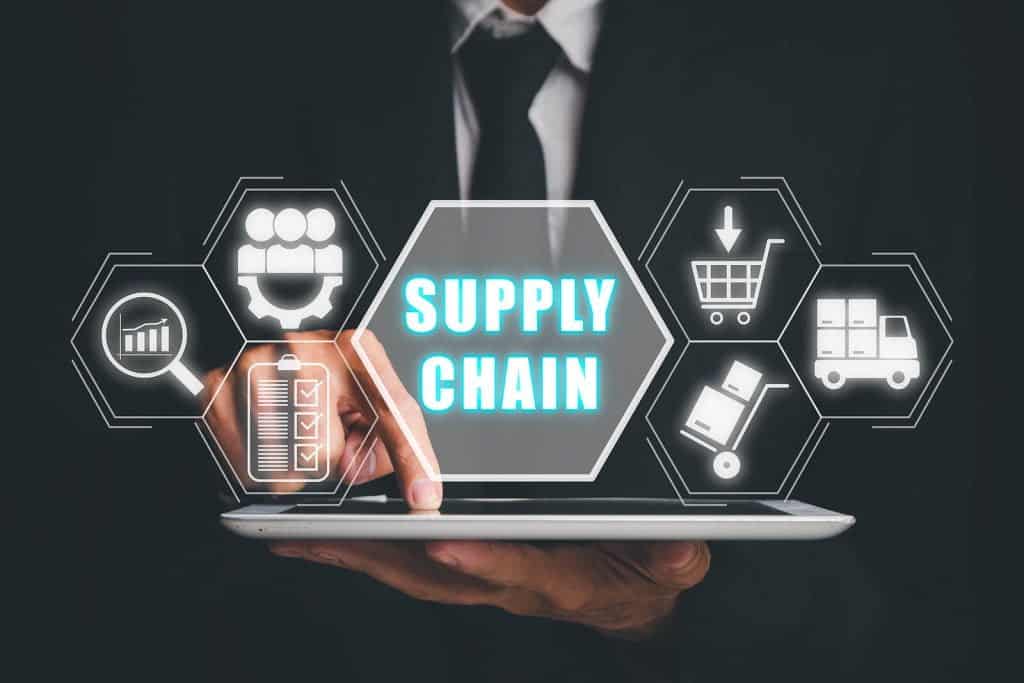Blockchain solutions are finding their application in diverse industries and revolutionizing how they operate. One such industry that has immensely reaped blockchain’s benefits is the Supply Chain Management industry.
At its most fundamental level, supply chain management (SCM) is the management of the flow of goods, data, and finances related to a product or service, from the procurement of raw materials to the delivery of the product at its final destination.
Conventional Supply chain models often incur regular challenges, such as :
Lack of privacy
The existing ERPs often find their privacy breached, which makes them lose out on commercial advantage. There are times when data needs to be confidential and when specific nodes need access to information. This calls for a versatile platform that can be both transparent and safe while securing sensitive information.
Adherence to Regulations and lack of strict laws
Existing ledgers are mutable and do not have strict laws to regulate their usage. This can lead to security breaches and cost companies vast amounts of money. Once that happens, there is an absence of authorities who can punish the perpetrators or laws that can help regulate these offenses.
Security
Apart from these, existing financial ledgers and ERPs are unreliable as they have less scope for third parties to be involved in supply-chain transactions. However, when integrated with blockchain technology, these challenges and roadblocks are handled efficiently.
All these challenges can easily be handled by incorporating blockchain technology into day-to-day operations. There are many Software firms in the market that offer reliable blockchain development services and elevate a business’s growth curve. Let us look at the advantages of blockchain-infused software solutions for businesses.
Advantages of Blockchain-infused Supply Chain Management
Authenticate the provenance of goods.
The origin of goods must be carefully mapped as they move through the supply chain, especially high-value assets, goods, and precious cargo. Blockchain technology, when integrated with supply chain management systems, provides detailed information on the assets and goods traveling in a supply chain and protects data from getting corrupted.
Get invaluable transparency
Supply chains require transparency at almost every level. However, transportation logistics is one avenue that needs it the most. It is crucial for numerous partners and stakeholders to be able to access information on goods for smoother flows in the supply chain. Blockchain simplifies information exchange between stakeholders, vendors, and users while confirming key milestones.
High-cost savings
Utilizing blockchain will also enable businesses to save money. With the use of blockchain, some manual processes that are presently necessary for transportation logistics procedures could be eliminated, improving efficiency and reducing the margin for mistakes. Because shipments will reach their destinations faster, Stinnes said that results in cost savings.
Better track and trace
Blockchain makes it extremely easy to track and trace components from the point of origin on the supply chain all the way to the consumer. The technology allows companies to map and locate all inventory at any given time on a supply chain. Since the ledger is immutable, it is also convenient for detecting phony products and ensures that the custody of products is secure throughout the process.
Top Use Cases of Blockchain in Other Avenues
Money Transfer
Bitcoins revolutionized the way we do transactions online. Smart immutable ledgers in the blockchain save banks and other companies a lot of money by reducing and even eliminating third-party fees. Companies working with complex supply chains can benefit largely from this application of blockchain technology.
Smart contracts
Smart Contracts are like technological contracts that are enforced in real-time on a blockchain, removing any middlemen. Smart contracts are immutable and can not be changed. An added benefit of smart contracts is that it is entirely transparent, and no single entity has access to it; i.e., it has decentralized authority and can be crucial for the security of a supply chain.
Internet of Things (IoT)
IoT is the next technology that has encouraged the large-scale adoption of blockchain. The ever-increasing demand for smart home appliances has led to a considerable increase in data breaches and safety concerns. Incorporating blockchain can help mitigate these risks by increasing transparency and supporting virtual incorruptibility.
Healthcare
The Healthcare industry never sees depreciation. No technology has been able to reduce the cost of good healthcare or cap it. However, blockchain might be able to do so, given its potential to improve access to information across stakeholders while protecting patient information. An advanced system incorporated with blockchain can collect and disseminate information to the proper authorities while reducing exorbitant costs.
Logistics
Shipping and Logistics is another industry actively employing blockchain and availing its benefits. Blockchain addresses the lack of communication and transparency in traditional supply chains and makes them more efficient.
Non-fungible tokens (NFTs)
The most popular application of blockchain, after cryptocurrency, is in the trade and purchase of Non-fungible assets, or NFTs. NFTs are digital items like music, art, GIFs, and videos traded on a blockchain network, ensuring that only a sole owner has rights to assets.
Conclusion
One can agree that blockchain technology is the future of all enterprises. Sooner the businesses realize this, the better. It’s high time businesses start investing in automating their operational workflows with blockchain technology. The return on investment on this business decision is high and exponential in the long run. Many companies in the market offer stellar Blockchain Consulting services and blockchain development services that businesses can consult before starting their project development. However, one must research extensively for the right Blockchain development company, best suited for their project.
FAQ
A: Blockchain technology in supply chain management acts as a transparent, decentralized ledger that records and verifies transactions, ensuring traceability and accountability throughout the supply chain. It enhances transparency, reduces fraud, and improves efficiency in moving goods and information.
A: Blockchain offers several benefits in supply chain management, including:
1. Transparency: All parties can view and verify transactions, reducing opacity and enhancing trust.
2. Traceability: Each step of a product’s journey can be tracked, ensuring authenticity and reducing counterfeiting.
3. Efficiency: Automated processes and smart contracts streamline operations, reducing paperwork and manual errors.
4. Security: Immutable and encrypted records prevent unauthorized alterations and data breaches.
5. Collaboration: Shared data allows for efficient collaboration and real-time information sharing among stakeholders.
A: Blockchain has found applications in various supply chain scenarios, including:
1. Provenance Tracking: Tracking the origin and journey of goods, especially in industries like food and luxury goods.
2. Supplier Verification: Validating the authenticity and compliance of suppliers and materials.
3. Inventory Management: Real-time updates on inventory levels, reducing stockouts and overstocking.
4. Smart Contracts: Automating contract execution and payments based on predefined conditions.
5. Cold Chain Monitoring: Ensuring the integrity of temperature-sensitive shipments like pharmaceuticals and food.
A: Blockchain’s decentralized and transparent nature ensures that all participants have access to the same information and can verify the integrity of transactions. This eliminates the need for intermediaries and reduces the risk of fraudulent activities, fostering trust and enhancing accountability among supply chain stakeholders.
A: Implementing blockchain in supply chain management can be complex due to technological integration, data standardization, and the need for cooperation among multiple parties. However, with proper planning, collaboration, and the support of experienced blockchain developers and consultants, the benefits of increased transparency and efficiency can outweigh the challenges.

